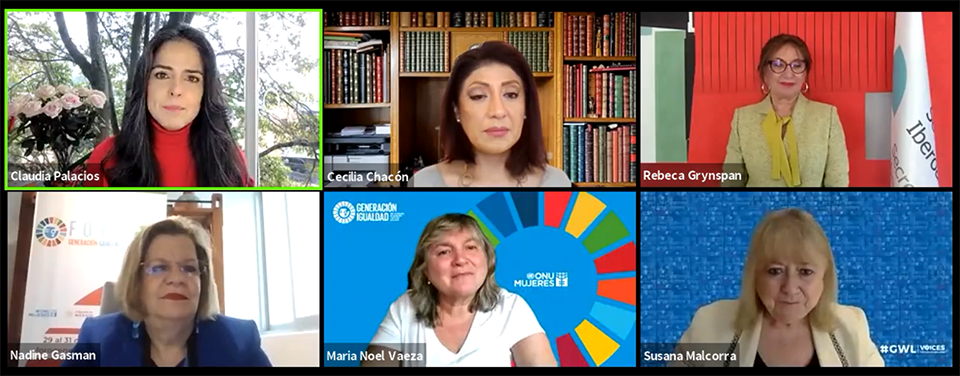UN Women and SEGIB present legislative advances and challenges for women's economic empowerment in Ibero-America
Date:

Over half (59%) of Ibero-American countries do not have laws that guarantee the principle of equal pay for work of equal value; in almost two thirds (64%) of them, women's freedom of choice of employment is restricted; and in practically all of Ibero-America (96%) paternity leave is equal to or less than 15 days.
At an event organized by the Government of Ecuador, UN Women and the Ibero-American General Secretariat (SEGIB), the results of the study "Advances and Legislative Challenges in the Area of Autonomy and Economic Empowerment of Women in Ibero-America" were presented at the sixty-fifth session of the Commission on the Status of Women (CSW65), the main international intergovernmental body dedicated exclusively to the promotion of gender equality and the empowerment of women.
Having a roadmap for reforming or overturning these laws is a basic and essential requirement to pave the way for real and substantive gender equality and the economic empowerment of women. Laws are the instrument for ensuring that direct discrimination, which undermines women's full enjoyment of their rights, is eliminated.
Ensuring the elimination of discriminatory legislation in the current pandemic situation represents an unprecedented opportunity to ensure that socioeconomic recovery in the countries of the Ibero-American region is inclusive and sustainable.
"In the current context of crisis and given the disproportionate impacts that this pandemic is having on women's autonomy and economic empowerment, this agenda is not only urgent but also an unprecedented opportunity to rebuild a new and better normal. Because a recovery with greater inequality cannot be considered a recovery," said Ibero-American Secretary General Rebeca Grynspan.
María-Noel Vaeza, Regional Director for UN Women, said: "A fundamental element to achieve the empowerment of women is the recognition and guarantee of their rights. Many of these rights have been historically denied. Despite the progress made in the region, we cannot forget the enormous challenge that still lies ahead: to protect the gains in gender equality from the danger of setbacks in the face of the COVID-19 crisis".
Cecilia Chacón, Secretary for Human Rights of Ecuador, the country hosting the event, stressed the importance of countries promoting the international legal instruments they have already signed, and which commit them to continue promoting women's labor and social rights at all levels. For example, ILO Convention 190 on violence and harassment in the world of work. "Convention 190 must be translated into mechanisms for the protection of rights for priority groups so that national standards can be strengthened to guarantee the rights of workers to decent work and a life free of violence," she said.
The institutions participating in the event stressed that the derogation of laws that discriminate against women and girls in Ibero-America is an urgent need in the context of the COVID-19 pandemic, in addition to an obligation already undertaken by all countries in the region in multiple international and regional instruments and conventions.
Contacts:
UN Women
José Baig: jose.baig@unwomen.org +31630156143
Pamela Ogando: pamela.ogando@unwomen.org +50762934493
SEGIB
Max Seitz: mseitz@segib.org